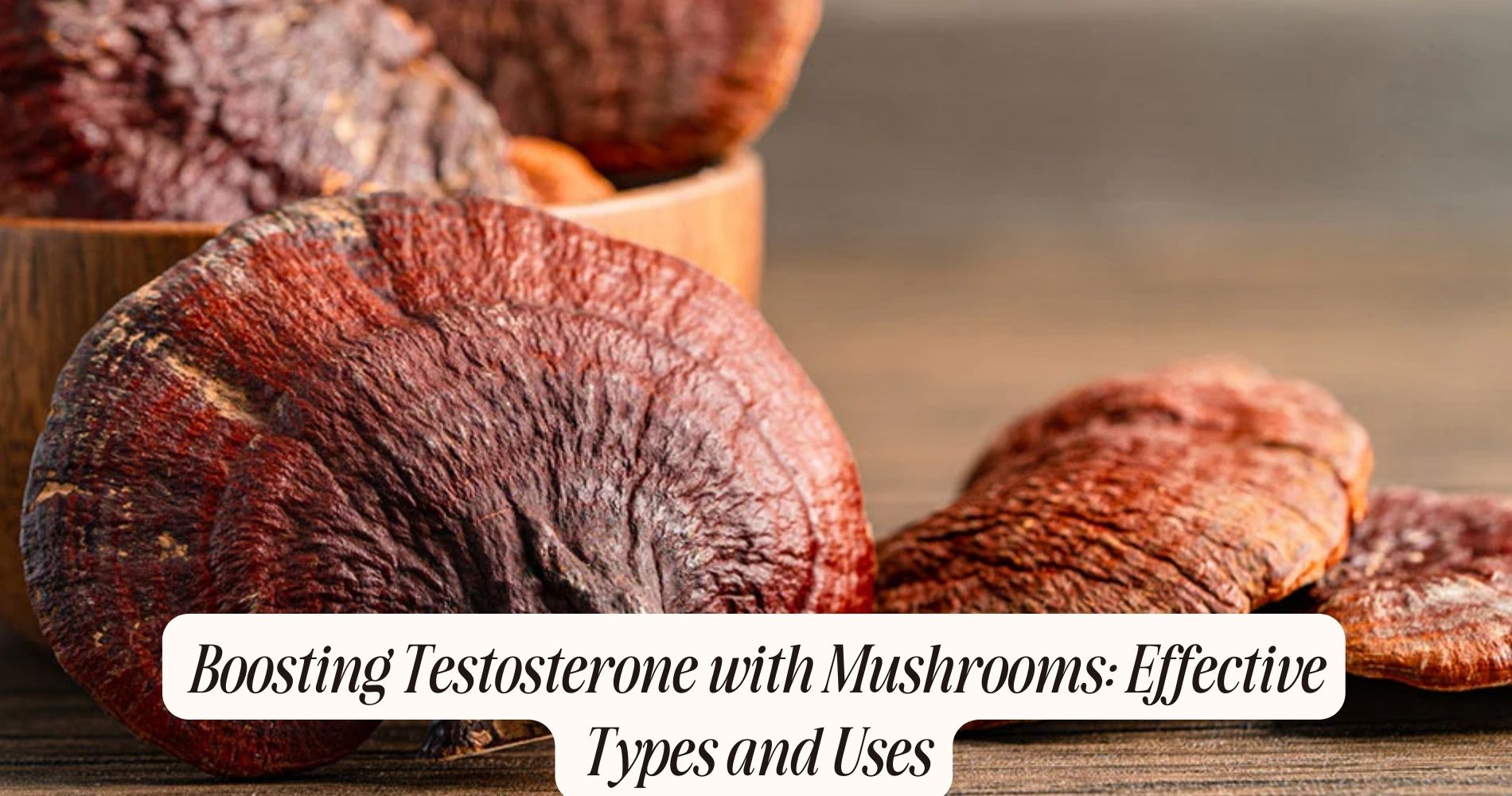
Are Mushrooms Heart-Friendly? Exploring Cardiovascular Benefits
Mushrooms pack a rich nutritional profile, offering essential vitamins, minerals, and bioactive compounds that contribute to overall health. When you examine their vitamin content, you'll find they're particularly high in B vitamins, such as riboflavin, niacin, and pantothenic acid. These vitamins play a critical role in energy metabolism, red blood cell production, and maintaining proper neurological functions.
From a mineral composition perspective, mushrooms are a significant source of selenium, potassium, and copper. Selenium functions as an antioxidant, protecting cells from oxidative stress and supporting immune function. Potassium is crucial for maintaining electrolyte balance and proper cardiovascular function, while copper is essential for iron metabolism and the formation of connective tissue.

Additionally, mushrooms contain various bioactive compounds, including polysaccharides and ergothioneine, which have been shown to exhibit anti-inflammatory and antioxidant properties. These compounds may further contribute to cardiovascular health by reducing oxidative stress and inflammation, which are critical factors for heart disease.
Types of Heart-Healthy Mushrooms
When considering heart-healthy mushrooms, which varieties offer the most cardiovascular benefits based on their bioactive components and nutrient profiles? Two standout types are Shiitake mushrooms and Maitake mushrooms.
Shiitake mushrooms contain eritadenine, a compound known to lower cholesterol levels. Clinical studies have demonstrated that eritadenine can inhibit the enzyme responsible for producing cholesterol in the liver, contributing to reduced plasma cholesterol concentrations. Additionally, Shiitake mushrooms are rich in beta-glucans, polysaccharides that enhance immune function and improve cardiovascular health by modulating blood lipid profiles.

Maitake mushrooms, also known as Grifola frondosa, exhibit significant cardioprotective properties. These mushrooms contain a unique polysaccharide called D-Fraction, which has been shown to enhance lipid metabolism and reduce blood pressure. Moreover, Maitake mushrooms are high in fiber and essential nutrients like potassium, which plays an important role in maintaining normal blood pressure levels.
Both Shiitake and Maitake mushrooms offer a potent combination of bioactive compounds and essential nutrients that support cardiovascular health. Incorporating these mushrooms into your diet could contribute to improved heart function and reduced risk of cardiovascular diseases, making them a valuable addition to heart-healthy dietary regimens.
Antioxidants in Mushrooms
Incorporating mushrooms into your diet frequently provides a rich source of antioxidants, which are essential for combating oxidative stress and supporting cardiovascular health.
Mushrooms are packed with polyphenols, a group of naturally occurring compounds known for their potent antioxidant properties. These polyphenols neutralize free radicals—unstable molecules that can cause cellular damage and contribute to the development of cardiovascular diseases.
Research indicates that the polyphenol content in mushrooms, such as ergothioneine and glutathione, plays a significant role in reducing oxidative stress. By scavenging free radicals, these antioxidants help prevent the oxidation of low-density lipoprotein (LDL) cholesterol, a key factor in the pathogenesis of atherosclerosis.
Atherosclerosis, characterized by the buildup of fatty deposits in the arterial walls, can lead to severe cardiovascular events like heart attacks and strokes.
Moreover, the anti-inflammatory effects of these antioxidants further enhance cardiovascular protection. Chronic inflammation is another critical contributor to cardiovascular disease, and the bioactive compounds in mushrooms help mitigate this risk.
Mushrooms and Cholesterol Levels
Recent studies have revealed that adding mushrooms to your diet can significantly lower LDL cholesterol levels, thereby reducing the risk of cardiovascular diseases. Mushrooms contain bioactive compounds, such as beta-glucans and ergosterol, which play a vital role in cholesterol metabolism. These compounds inhibit cholesterol synthesis in the liver and enhance the excretion of bile acids, effectively lowering LDL cholesterol.
Clinical trials have demonstrated that regular consumption of mushrooms leads to improvements in lipid profiles. Participants who included mushrooms in their daily diet showed a significant decrease in total cholesterol and LDL cholesterol levels, while maintaining or even increasing HDL cholesterol levels. This lipid-modulating effect is important for cardiovascular health, as a balanced lipid profile is essential for preventing atherosclerosis and other heart-related conditions.

Moreover, the presence of antioxidants in mushrooms contributes to the reduction of oxidative stress, which is a key factor in the degradation of lipid molecules. This synergy between cholesterol metabolism and lipid profiles makes mushrooms a potent dietary addition for cardiovascular protection.
Anti-Inflammatory Properties
You'll find that mushrooms exhibit significant anti-inflammatory properties, essential for cardiovascular health. They reduce inflammatory markers such as C-reactive protein, lower oxidative stress by neutralizing free radicals, and modulate the immune response to prevent chronic inflammation.
These effects contribute to a healthier vascular system and reduced risk of cardiovascular diseases.
Reducing Inflammatory Markers
Numerous studies have demonstrated that mushrooms possess important anti-inflammatory properties by reducing levels of inflammatory markers such as C-reactive protein and cytokines. When you incorporate mushrooms into your diet, you're not just adding flavor; you're also benefiting from their high dietary fiber content and bioactive compounds. These elements play a vital role in modulating immune responses and reducing systemic inflammation.
The dietary fiber in mushrooms helps regulate gut health, which is intimately linked to systemic inflammation. A healthier gut microbiome can lower inflammatory responses, thereby reducing cardiovascular risks. Additionally, mushrooms are rich in bioactive compounds like polysaccharides, phenolic acids, and sterols. These compounds have been shown to inhibit the production of pro-inflammatory cytokines, thereby alleviating inflammation.
Clinical trials have consistently shown that regular mushroom consumption can lead to a noticeable decrease in C-reactive protein levels, a key marker of inflammation. For instance, a study published in the Journal of Medicinal Food found that participants consuming mushrooms daily had significantly lower levels of inflammatory markers compared to a control group. Therefore, by incorporating mushrooms into your diet, you can proactively reduce inflammation and support cardiovascular health.
Lowering Oxidative Stress
By integrating mushrooms into your diet, you can significantly lower oxidative stress, thanks to their rich antioxidant profile. Mushrooms are packed with compounds like ergothioneine and glutathione, which are potent antioxidants that combat free radicals. Free radicals are unstable molecules that can cause cellular damage, leading to various cardiovascular diseases.
Clinical studies have shown that these antioxidants in mushrooms can neutralize free radicals, thereby reducing oxidative stress. Oxidative stress is a critical factor in the development of atherosclerosis, a condition characterized by the hardening and narrowing of the arteries due to plaque buildup. By mitigating oxidative stress, mushrooms help protect the endothelial cells lining your blood vessels from cellular damage, ensuring ideal cardiovascular function.

Furthermore, the anti-inflammatory properties of mushrooms can also contribute to lowering oxidative stress. Chronic inflammation often accompanies oxidative stress, exacerbating cellular damage and contributing to the progression of heart disease. By reducing inflammation, mushrooms not only lower oxidative stress but also provide a dual benefit in promoting cardiovascular health.
Modulating Immune Response
In addition to lowering oxidative stress, mushrooms exert substantial anti-inflammatory effects, which play an essential role in modulating the immune response and protecting cardiovascular health. Research indicates that specific compounds in mushrooms, such as beta-glucans, can influence cytokine production. By regulating the release of pro-inflammatory cytokines, these bioactive substances help to mitigate chronic inflammation, a critical factor in cardiovascular diseases.
Moreover, mushrooms have been shown to enhance adaptive immunity. For instance, polysaccharides found in certain mushroom species can stimulate the proliferation and activation of T-cells and B-cells. This modulation of adaptive immunity promotes a more balanced and effective immune response, reducing the risk of excessive inflammation that can damage blood vessels and lead to atherosclerosis.
Clinical studies support these findings. One study demonstrated that consuming mushrooms like shiitake can significantly lower markers of inflammation, including C-reactive protein, in participants. By curbing inflammatory pathways and supporting immune function, mushrooms contribute to overall cardiovascular health.
Incorporating these fungi into your diet could be a strategic approach to bolstering heart health through their multifaceted immune-modulating properties.
Blood Pressure Regulation
Emerging research indicates that certain compounds in mushrooms can directly influence blood pressure regulation. One key area of focus is their impact on sodium balance and potassium levels. Mushrooms are naturally low in sodium and high in potassium, a combination that promotes peak cardiovascular function. By maintaining a low sodium intake and a higher potassium intake, you can support your body's ability to manage blood pressure more effectively.
Potassium plays a critical role in vasodilation, which helps relax blood vessels, thereby reducing blood pressure. Additionally, the bioactive compounds in mushrooms, such as ergothioneine and beta-glucans, exhibit antihypertensive properties. These compounds help modulate the renin-angiotensin-aldosterone system (RAAS), a hormone system that regulates blood pressure and fluid balance.
Furthermore, mushrooms contain antioxidants like selenium and vitamin D, which contribute to endothelial function and reduce oxidative stress. These mechanisms collectively support arterial health and blood pressure regulation. By incorporating mushrooms into your diet, you may benefit from their multifaceted approach to cardiovascular health, particularly in balancing sodium and potassium levels and mitigating factors that contribute to hypertension. This makes mushrooms a valuable ally in maintaining heart health.
Boost Your Heart Health with Well Gummies
To complement the heart-healthy benefits of mushrooms, consider integrating Well Gummies' 10-IN-1 MUSHROOM GUMMIES into your daily wellness routine. These gummies are not only easy and convenient to use but are also packed with a blend of 10 functional mushrooms known for their cardiovascular benefits. Each gummy offers a burst of natural energy, enhanced focus, and robust immune support, helping to maintain a balanced body and a clear mind. Enjoy the delightful taste of fresh wild berries, as tasty as your favorite candy, but without any jitters or crashes. Make Well Gummies a part of your heart-friendly diet and experience sustained vitality throughout your day.
Frequently Asked Questions
Can Mushrooms Interact With Heart Medications?
Yes, mushrooms can interact with heart medications. It's important to take into account potential drug interactions, as they might alter therapeutic effects. Always consult your healthcare provider before adding mushrooms to your diet to guarantee safety.
Are There Any Side Effects of Consuming Mushrooms Daily?
Daily mushroom consumption can impair nutrient absorption and affect digestive health due to high fiber content, leading to bloating or gas. Clinical evidence suggests moderation is key to avoid gastrointestinal discomfort and maintain balanced nutrient intake.
How Do Mushrooms Compare to Other Plant-Based Foods for Heart Health?
When comparing mushrooms to other plant-based foods for heart health, you'll find mushrooms have high nutrient density and rich antioxidant levels. These properties can enhance cardiovascular function more effectively than many other plant-based options.
Are There Specific Cooking Methods That Preserve Mushrooms' Heart Benefits?
Yes, you can optimize antioxidant preservation in mushrooms by using specific cooking techniques. Steaming and microwaving are clinically shown to maintain these heart-beneficial compounds better than frying or boiling, which can degrade antioxidants.
Can Mushrooms Support Heart Health in Individuals With Existing Heart Conditions?
Yes, mushrooms can support heart health in individuals with existing heart conditions. They contribute to cholesterol reduction and help manage blood pressure, offering clinically significant benefits supported by evidence-based research in cardiovascular health management.
Conclusion
Incorporating mushrooms into your diet can be a strategic move for cardiovascular health. They're packed with antioxidants, help regulate cholesterol, and exhibit anti-inflammatory properties.
Specific types like shiitake and oyster mushrooms have been shown to support heart health. Clinical studies indicate their potential to lower blood pressure and improve overall cardiovascular function.
By adding these nutrient-dense fungi to your meals, you're making a heart-friendly choice backed by scientific evidence.




